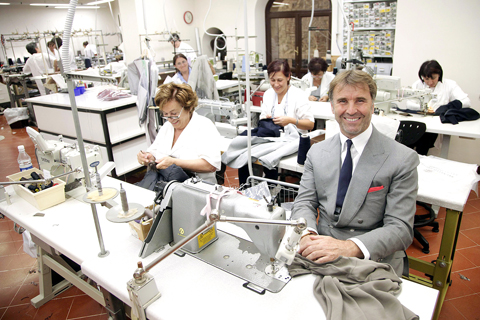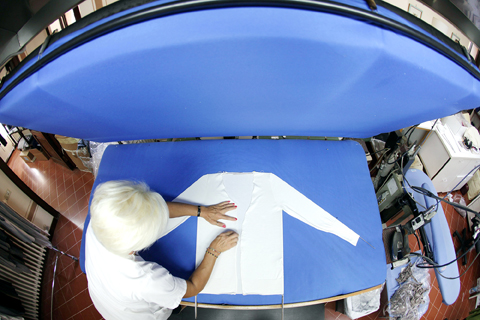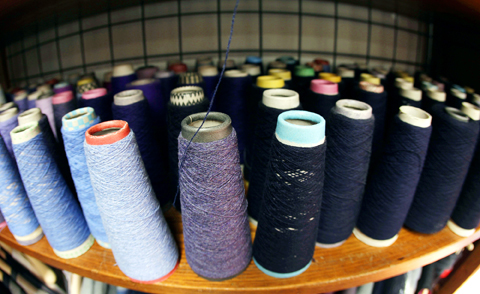Motivated at age 15 by the tears in his father’s eyes when the former farmer was forced to accept a factory job, Brunello Cucinelli is anything but an orthodox capitalist.
His colorful cashmere brand is defying recessionary shrinkage across the luxury sector — a feat achieved while creating ideal conditions for his workers.
He has converted most of a stone 14th-century town in Umbria into a factory where no one punches a time clock, lunch breaks are generous and the only rules pasted on the walls are quotes from philosophers and writers.

PHOTO: REUTERS
“I believe in real capitalism. The company has to make profits,” he said in a sprawling, spotless office lined with shelves of spools of cashmere on one side and philosophical treatises on the other.
“But I want to try to do it with the ethics of human dignity,” he said.
Consultants Bain & Co forecast global sales of luxury goods this year would fall about 8 percent to 153 billion euros (US$229 billion). But Cucinelli, who can collect more than US$2,000 for a single garment, is still expanding.

PHOTO: REUTERS
In September his privately held Gruppo Cucinelli opened a new mono-brand store on Rome’s exclusive Via Borgognona near the Spanish Steps. There are plans for 10 more by the end of next year.
Revenues this year are forecast at 154 million euros, about 7 percent more than last year. It’s a slowing trend from double-digit gains in both sales and profit in previous years, but puts Cucinelli in select company: Hermes and Louis Vuitton are among the only luxury brands growing this year.
“Brunello Cucinelli’s ... is an understated product — it’s not logo-mania — and highly sophisticated,” said Armando Branchini, head of Milan fashion consulting firm Intercorporate.

PHOTO: REUTERS
The combination of classic style with a modern touch, thorough workmanship and very high quality basic materials is, he said, helping Cucinelli and another Italian cashmere brand, Loro Piana, to win market share.
For the designer, whose garments are sold in 29 dedicated stores in places like New York, Paris, Beverly Hills, London, Saint Tropez and the Hamptons and in high-end department stores such as Saks Fifth Avenue, Neiman Marcus and Bergdorf Goodman, success is just part of the objective.
When Cucinelli, now 54, was a teenager, his father stopped being a farmer and got a job in a cement factory and Cucinelli noticed a deep change.
“He came home from the factory with tears in his eyes and I resolved that whatever I would do with my life it would be an attempt to make work more human,” he said.
ASPARAGUS GREEN
Cucinelli was one of the first in Italy to use cashmere dyed with bright colors on a large scale — similar to what Benetton did with sweaters, but for a very high-end customer. Asparagus green is one of his notable shades and shirts start at US$500.
In 1985 he bought a run-down 14th-century castle in the Umbrian hill town of Solomeo, home of his future wife, and moved the headquarters of his company there after restorations were well under way in 1987.
His company has about 500 in-house employees and about 1,000 outside contractors. Cashmere from Mongolia is imported and prepared by another Italian company under strict Cucinelli specifications.
The full-time employees work either in the upper part of the town, where sample garments are designed and created for the sales force, or in a new building in the lower part of the town, where the bulk of the garments are produced.
The walls near the plant, which now occupies much of Solomeo, are lined with ceramic plaques showing aphorisms Cucinelli wants his workers to mull on as they go about their daily lives.
They include Socrates: “A life without searching is not worth living”; Aristotle: “Nature does nothing that is useless”; and Galileo: “Behind every problem lies an opportunity.”
From the outside, the stone buildings that house the cutting rooms, the designers’ studios and offices give no hint of what is going on inside.
On one recent autumn day, some women worked in a small room using specialized machinery to stitch together pieces of garments while nearby colleagues looked under large magnifying glasses to check quality.
FLEXIBLE
“Compared with previous jobs I have had, I like it very much,” said Daniela Allumi, who has been in the garment industry for 40 years. “We grandmothers and mothers have family problems from time to time and when we do they are very flexible here.”
At 1pm, no bell or horn rang but the workers walked leisurely across the road to the company “restaurant” — one doesn’t call it a canteen — for a 90-minute lunch break.
“The underlying question is what do to with the profits,” said Cucinelli, whose mother worked stitching at home for a large Umbrian clothing company.
He started his first cashmere business in 1978 in a tiny workshop and sent his first creations to Germany and the US “because there they paid right away.”
Now living in a very comfortable villa, Cucinelli plays on a local soccer team and sometimes joins in poker at the local bar.
He has built a 230-seat theater to be used as a regional repertory theatre and workers and residents can relax in an olive orchard garden around his villa or use a sports complex he built.
“Part of the profits have to go to help humanity. That means a church, a theater, or a work of charity. That is what I think the system of business should be,” he said.
No one in Solomeo checks if a worker comes back on time from lunch. Those who choose to eat at the factory pay only 2.80 euros for a three-course meal cooked by local women using local ingredients. The place runs on an honor system.
“When the human being finds favorable conditions of life he is more creative,” Cucinelli said. “If we want to make high-quality goods we need human beings. To convince the human being to do a humble work we have to make that work dignified.”

Authorities have detained three former Taiwan Semiconductor Manufacturing Co (TMSC, 台積電) employees on suspicion of compromising classified technology used in making 2-nanometer chips, the Taiwan High Prosecutors’ Office said yesterday. Prosecutors are holding a former TSMC engineer surnamed Chen (陳) and two recently sacked TSMC engineers, including one person surnamed Wu (吳) in detention with restricted communication, following an investigation launched on July 25, a statement said. The announcement came a day after Nikkei Asia reported on the technology theft in an exclusive story, saying TSMC had fired two workers for contravening data rules on advanced chipmaking technology. Two-nanometer wafers are the most

Tsunami waves were possible in three areas of Kamchatka in Russia’s Far East, the Russian Ministry for Emergency Services said yesterday after a magnitude 7.0 earthquake hit the nearby Kuril Islands. “The expected wave heights are low, but you must still move away from the shore,” the ministry said on the Telegram messaging app, after the latest seismic activity in the area. However, the Pacific Tsunami Warning System in Hawaii said there was no tsunami warning after the quake. The Russian tsunami alert was later canceled. Overnight, the Krasheninnikov volcano in Kamchatka erupted for the first time in 600 years, Russia’s RIA

CHINA’s BULLYING: The former British prime minister said that he believes ‘Taiwan can and will’ protect its freedom and democracy, as its people are lovers of liberty Former British prime minister Boris Johnson yesterday said Western nations should have the courage to stand with and deepen their economic partnerships with Taiwan in the face of China’s intensified pressure. He made the remarks at the ninth Ketagalan Forum: 2025 Indo-Pacific Security Dialogue hosted by the Ministry of Foreign Affairs and the Prospect Foundation in Taipei. Johnson, who is visiting Taiwan for the first time, said he had seen Taiwan’s coastline on a screen on his indoor bicycle, but wanted to learn more about the nation, including its artificial intelligence (AI) development, the key technology of the 21st century. Calling himself an

South Korea yesterday said that it was removing loudspeakers used to blare K-pop and news reports to North Korea, as the new administration in Seoul tries to ease tensions with its bellicose neighbor. The nations, still technically at war, had already halted propaganda broadcasts along the demilitarized zone, Seoul’s military said in June after the election of South Korean President Lee Jae-myung. It said in June that Pyongyang stopped transmitting bizarre, unsettling noises along the border that had become a major nuisance for South Korean residents, a day after South Korea’s loudspeakers fell silent. “Starting today, the military has begun removing the loudspeakers,”